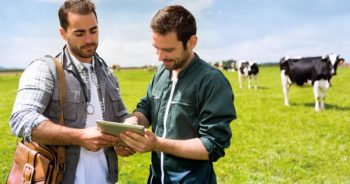30 Jun 2020
With lockdown easing, vets should look at fresh ways to maintain socially distanced dialogue with farm animal keepers in the present and future.

Farm vets have been urged to get plans in place now to better communicate with their large animal clients in a socially distanced present and future.
Boehringer Ingelheim conducted a survey – FarmComm – in May. Farmers were asked how they would most like to receive vital preventive health and other advice from vets in the new normal and beyond.

Responses from 387 farmers, from a wide geographical spread and across beef/sheep and dairy keepers, were received and 54% said they did not see their vets regularly – mainly only as and when necessary.
Boehringer senior brand manager Matt Yarnall said: “The key take-home was that farmers do want to hear more from their vets – whether that’s one‑to one information or meetings.
“So, for vets wondering how they engage with their farmers under the current situation, the key thing is to not wait, but get plans in place now – whatever means they’re comfortable with.
“We asked some finer details on the best means to communicate in different situations, and there were some surprises, and we’re keen to work with practices to maximise engagement.”
While the study was top line in terms of the specific information farmers were yearning for, Mr Yarnall said a significant number of programme review meetings were required with the bovine viral diarrhoea Stamp It Out and BVDFree programmes. The need to reduce antibiotic use and guidance on reducing mastitis were other highlighted areas.
On some of the specific communication methods, Mr Yarnall said: “Three times as many farmers would like to communicate with their vet on WhatsApp going forward, compared to currently. And this extends to small group meetings through WhatsApp or other social media platforms.
“The biggest surprise was that Facebook was so popular for a means of information transfer. I guess the demographic we’re looking at has either grown up with Facebook or has joined because their sons and daughters are on it. More than a fifth of farmers get animal health information from Facebook, which really makes you think whether practices are making the most of this medium.”
BCVA president Nikki Hopkins said many vets had been improvising “out of necessity” in terms of how they worked with farmers.
She said: “During the peak of lockdown, only the most essential work was being done, and farmers meetings and other routine face-to-face work, such as medicine reviews and health plans, had to be postponed. But now we are easing back into these routine aspects, as they have an impact on the long-term health and welfare, and they require a different way of working at present.
“If a visit is not able to be carried out immediately for a COVID reason, then lots of practices have been using WhatsApp or emails to receive pictures of the cow or the clinical issue, so that initial triaging can be done, decisions made on whether a visit is necessary or if remote prescribing is appropriate in this case. Some practices have also been carrying out remote or virtual parlour visits and interactive farm walks.”
Dr Hopkins agreed with Mr Yarnall that methods needed to be implemented now, and many would stay if they were more time and environmentally efficient.
She said: “Vets and farmers are busy people, so driving huge distances for farmer training could be replaced by a mix of pre-recorded online training that can be fitted in around busy schedules. Medicine training and workshops, and sending of records for health plans pre-meeting, seem to fit well with an online platform.”
For more on FarmComm and measures you could implement with farmers, contact your Boehringer representative. BCVA COVID-19 resources are available online.